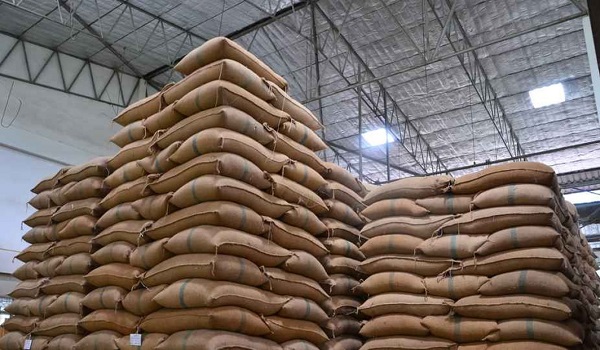The Food Corporation of India (FCI) has reported its lowest stocks of rice and wheat in the month of August since 2017, sparking concerns about potential inflationary pressures. While this decline in stocks might sound alarming, experts are assuring the public that there is no immediate threat to the country’s food security, as the current stocks still exceed required norms.
As part of the government’s efforts to secure food supplies, it had set a target to procure 521 lakh metric tonnes of rice for the kharif marketing season of 2023–24, a notable increase from the previous year’s 495 lakh metric tonnes.
The total foodgrain stocks in FCI’s possession as of August 22 stand at 523.35 lakh metric tonnes, with rice accounting for 242.96 lakh metric tonnes and wheat comprising 280.39 lakh metric tonnes. Despite the dip in stocks, analysts emphasize that this situation does not pose a direct threat to food security, as historically, India has stored more than required. However, the reduced production this year might exert upward pressure on prices. Government interventions, such as augmenting domestic supplies, could mitigate the price impact to some extent.
Dipti Deshpande, Principal Economist at Crisil, explains that while the current stock levels are still higher than required norms, the overall reduction in production this year could influence prices. She adds that historically, India has maintained ample reserves beyond norms, lending confidence to the current situation.
Experts point out that the rise in acreage devoted to rice during this kharif season will ensure sufficient rice availability. However, there is some concern about wheat, with Rahul Bajoria, MD & Head of EM Asia (ex-China) Economics at Barclays, suggesting that wheat might face slightly more vulnerability.
Wheat cultivation typically occurs during the rabi season, which begins in October. The Centre’s procurement of wheat under the minimum support price (MSP) scheme, a vital measure to regulate wholesale rates, has fallen short of the target. The procurement stood at around 26.14 million tonnes, considerably below the 34 million tonnes goal. This shortfall in procurement has led to firmer prices even during the harvest period, which would typically see lower prices. Notably, in June, the food ministry had to impose stock limits on cereal for the first time since 2008. Additionally, India placed a ban on cereal exports in May 2022.
Data from the latest Ministry of Agriculture and Farmers’ Welfare report indicates an expansion in the area dedicated to rice cultivation, growing from 312.80 lakh hectares to 328.22 lakh hectares. The upcoming harvest is expected to start in October, bringing some relief to the supply situation.


